 holiness is natural holiness is natural Many years ago I had the blessing of meeting an older priest who had retired from active ministry, though he had permission to say one Mass every Sunday at a chapel in a converted barn on land belonging to his brother. It was an incredible gift to have met Monsignor,* especially since he was clearly holy, possessing many spiritual gifts, a man of humility and love. His holiness seemed natural to him, though I know it is something in which he grew throughout his life. I also know holiness (such as his) is natural insofar as it is something we are all called to and that we are all capable of attaining. Among other things, an important aspect of living a holy life is the importance of being an example. Someone who lives a holy life can and often does offer inspiration to others, encouraging spiritual growth through their words and deeds. Therefore, when we choose to work at growing in holiness, what we are choosing is to affect the lives of others through our witness. Of course, it is worth the effort for many reasons, but especially because our holiness pleases God. 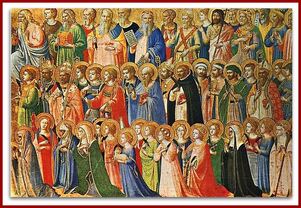 what we do gives witness what we do gives witness Although our holiness does not really need the influence of another, (but only that of the Holy Spirit), it certainly helps to have good examples such as the Monsignor. Without holy ones to be as our spiritual heroes the seeds of holiness can remain ‘un-watered,’ diminishing the chances of development. Further, what we do gives witness to what is at the center of our hearts. If we believe that we can grow in holiness, then with effort we will. But if we believe there is no way we can become holy, then not only will we stunt our own growth, but there will be little to inspire others to work at it either. In other words, to be holy is not only a call, but in a way, it is our responsibility since as disciples our work is that of building the Kingdom. Additionally, our efforts at holiness are the best gifts we can offer to God as a gift of love. 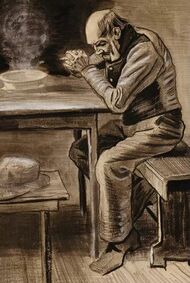 the Sacraments, study, and prayer the Sacraments, study, and prayer To be holy means learning to love more fully and without restraint, that is, as Jesus taught, and to recognize our ‘threefold’ identity in God: we are children of the Father, disciples of Jesus, empowered by the Holy Spirit. Once we have accepted our status in these ways and truly take ourselves and our call to discipleship seriously, committing more deeply to our covenantal relationship with God through the Sacraments, study, and prayer, putting into action what we learn and pray, then we are truly on the road to holiness. Given that holiness is about what grows in our heart, a point to ponder is the lasting effects of the love which is at the center of holiness and which marks us as true disciples of Jesus. In each of the parables found in Matthew 25, Jesus indicated that it is the quality of our love that will build the Kingdom, and it is what we will be judged on. Thus, we work at building the Kingdom by building upon the graces we have received; as we grow in holiness, we do that which Jesus has called us to do. 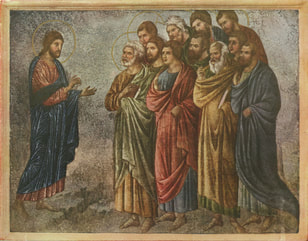 "you will do greater things than these" "you will do greater things than these" That being said, we must remember that in the Gospels Jesus made it clear that His disciples would have powerful spiritual gifts. So why don’t we take Him at His word? Jesus said: "Amen, amen, I say to you, whoever believes in me will do the works that I do, and will do greater ones than these….” (John 14:12) If we truly believe this, then we can and should be doing the greater things of which Jesus spoke. The works Jesus promised that His disciples would do were not just for the first century Church, but they were meant for all those who believe and have joined themselves to Him through Baptism. If we accept the entire message of the Gospels, and if we take to heart Jesus’ call and especially those very words of ‘doing greater things,’ it will happen.Therefore, we should be interceding by praying for healing of every sort and for issues of justice, teaching the Gospels in word and deed, helping the poor, and all the things Jesus said His disciples would do, and we should do it with the faith and belief that we can.** This does not mean our prayers and intentions will always provide the results we want, because what God does is based upon His wisdom and love, not ours. But Jesus said our faith will move mountains, so we should trust in Him enough to believe we can move them, first by praying, then by acting in ways that cooperate with that for which we have just prayed. In truth, it is His Holy Spirit working through the holy ones that moves mountains! Many Saints have shown that the best way to grow in holiness is to be about doing small things with great love, though we should not limit ourselves: we can do the ‘big things’ with our love, too. Nonetheless, loving in small ways is something we can all do, and it is an effective way to begin. As love becomes our motivation, it will also become our power to persevere. It will enable our growth in humility and selflessness, leading to a habit of loving in greater ways than we thought possible. Simply put, holiness means to become as Christ: to not only put on the mind of Christ, but His heart as well.  witness to the love of Jesus witness to the love of Jesus May we desire to grow in holiness that we might become a witness to the Love of Jesus! May we be inspired by the lives of the holy ones to help move us to do greater things! And may we call upon the Lord to help us stay committed to the work of spiritual growth! Let us meet in the mind and heart of Jesus! Peace! ©Michele L. Catanese * The holy priest was Msgr. Francis P. Ferme of the Diocese of Brooklyn, NY. He passed away in 1984. He had a beautiful spirit about him, and it was clear that he was a man of prayer who cared deeply about his little flock. He also had many spiritual gifts that I witnessed firsthand. I was blessed to have known him and continue to pray for his intercession. For a bit more on him, go to https://stannsyonkers.org/history-of-st-anns ** You can find the greater things which Jesus spoke of in the commissioning of the apostles in the synoptic Gospels, specifically Matthew 10:1, 7-8; Mark 3:13-15 and Mark 6:7 ff; Luke 9:1-2; and finally the passage I quoted in its fullness, John:14-12-14. Also if you read the Acts of the Apostles you will see the fruit of Jesus’ words in the miracles the apostles were able to accomplish. Images: 1. My photo, taken on the grounds of the Biltmore Estate in Asheville, NC. Holiness speaks to me of natural beauty. 2. Fresco painting, The Forerunners of Christ with Saints and Martyrs, by Blessed Fra Angelico. (1423-1424), located in the church of San Domenico, Fiesole, near Florence, Italy. 3. Painting, The Prayer, by Vincent van Gogh. (1882) 4. Painting, Jesus Missions the Apostles, by Duccio di Buoninsegna, (circa 1300) 5. Icon, St. Therese of Lisieux Doctor of the Church, by Fr. William Hart McNichols. The Little Way of St. Thérèse was all about doing small things with great love.This icon can be found at https://fineartamerica.com/featured/st-therese-of-lisieux-doctor-of-the-church-043-william-hart-mcnichols.html 6. My photo, Smoky Mountains near Gatlinburg, TN. Note: In compliance with GDPR rules, I wish to make it clear that I do not gather any information on any of my readers at any time.  prayers for help were answered prayers for help were answered About ten years ago a car accident took place in Missouri in which a priest appeared out of nowhere, prayed for a while with a young woman trapped inside her car, and then seemingly disappeared. The story went viral and yet no one seemed to know the priest, where he came from or where he went. Many speculated that he may have been an angel who came in response to the prayers of both the injured woman and the first responders whom she had asked to pray out loud for her. While there are many possible explanations, the fact that prayers for help were answered is an assurance that God intervened regardless of who it was that came and offered assistance. God can do all things and does send angels in many forms; they do not necessarily have to appear as winged beings as we most often think of them. Either way, it is important that we broaden our vision and recognize that not only do angels come among us, but that we may have already encountered them; that is, we may have “entertained angels unaware.” (Hebrews 13:2) There are many stories recorded in the Scriptures that mention angels. One of the most significant is that of the three angels who visited Abraham and Sarah, (Genesis 18:1-15).*Abraham prepared a meal for them and gave them the greatest hospitality that he could offer. At the end of the meal the angels in disguise revealed that Sarah would bear a son in her advanced age. Another significant account is that of the Archangel sent by God in the story of Tobias: the Archangel Raphael appeared as a man named Azariah in answer to the prayer of the recently blinded Tobias while simultaneously answering the prayer of a young woman named Sarah who begged for help because she was tormented by a demon. (Book of Tobit) The Gospels also mention angels numerous times, so we can correctly ascertain that angels continue to serve God by rendering aid to those who pray for help. 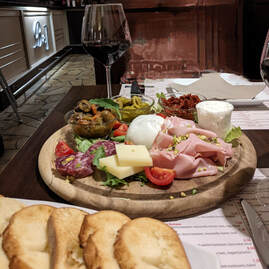 we offer the refreshment of friendship and care we offer the refreshment of friendship and care However, what the writer of Hebrews was saying was less about real angels than it was about how we should treat all those who we welcome into our homes and our churches. In other words, the real message is that we should recognize the possibility that we might be the assistance God provides for someone who is in need. In this way we are to act like the angels insofar as we are called to humbly serve, not waiting for someone else to do what we might be able to do. To be as an angel means we act selflessly in love, perhaps by simply being present and listening to the other, offering comfort and assistance if necessary. To be as an angel means that we open our hearts to others, inviting them in, so to speak, which does not always mean something dramatic is going on the other person’s life or that we are to do anything outwardly heroic; rather, it means we are totally present to the other and we offer the refreshment of friendship and care. 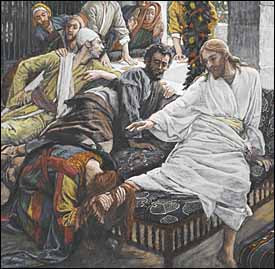 hospitality of the heart hospitality of the heart Two aspects come to mind concerning acting in love and selfless service. First, we might be the ‘host’ who is to offer hospitality in our welcome to the stranger or friend. "Entertaining angels unaware" implies that we should always act with hospitality of the heart, treating everyone with respect as welcomed guests would be treated. Jesus clearly valued this kind of behavior, something we see in a dramatic encounter He had in which He was the guest at the home of a rich man. A penitent woman washed Jesus’ feet with her tears, wiped them with her hair, and then anointed them with costly oil. When the host criticized her, Jesus responded that this host had not greeted Him appropriately, and had neglected to wash His feet and anoint Him on the head, (customary at the time), pointing out his lack of hospitality. (Luke 7:36-50) The second aspect, one we often miss, is that of knowing how to be a good guest. The guest should graciously accept the hospitality offered and be clear in his/her gratitude. And at a larger gathering, a guest (this pertains to all of us) also needs to remember that when they enter a room, they are not the most important person in it! Therefore, guests should act accordingly, with humility and respect to the host and anyone else present: each of the other guests is also a child of God and therefore is as ‘an angel in disguise.’ If we come in thinking ourselves as the first, then as Jesus says, we will be the last. (Matthew 20:16) Even if we are the sole guest, we are to remain gracious and humble, just as Jesus was when He was eating and drinking with His friends. 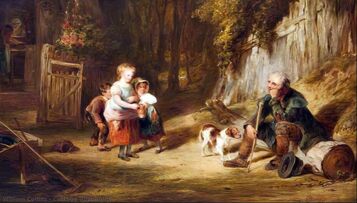 hospitality is an important component to discipleship hospitality is an important component to discipleship It would be good to pray with the Scriptures (particularly the Gospels) which refer to hospitality, reflecting upon our own behavior when we are the host and when we are the guest. Hospitality is an important component of discipleship and it can make a difference in the lives of those who we meet. We may never know when we have made such a positive impression that it sparks someone to conversion in some way or another. Instead of 'entertaining angels unaware' we should treat each one as if he or she is an esteemed guest; it is something we can do whether it is in our actual home, or simply by inviting others into the domicile of our heart. When we welcome the guest, we also welcome Christ. 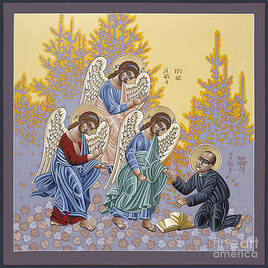 may we act with love may we act with love May we act with love in entertaining the ‘angels’ we encounter! May we grow in self-awareness, discerning when we need to speak and when we need to listen! And may we be as Christ to others, recognizing when they are as Christ to us! Let us continue to meet in the Heart of Jesus! Peace! ©Michele L. Catanese * The angels in this encounter were in reality the Holy Trinity. Also, remember that at the time of this event, Abraham and Sarah were still called by their original names, Abram and Sarai. Their names were changed by God later as a sign of their new mission. Images: 1. My photo; Summer sky in Texas. 2. Icon; The Holy Trinity by St. Andre Rublev. 3. My photo; Charcuterie Board, Ragusa, Sicily. The charcuterie board and a glass (or two) of wine is the quintessential Italian hospitality feast. 4. Painting, The Penitent Woman by James Tissot. 5. Painting, Cottage Hospitality by William Collins (1824-1889) 6. Image; Holy Theologian Bernard Lonergan by Fr. William Hart McNichols. In a symbolic way, the ‘angels’ are a depiction of the Holy Trinity, in this case, coming to the aid of Fr. Lonergan, one of the great Catholic theologians. It is reminiscent of those that came to Abraham and Sarah. You can find this at fineartamerica.com/featured/holy-theologian-bernard-lonergan-122-william-hart-mcnichols.html Note: In compliance with GDPR rules, I wish to make it clear that I do not gather any information on any of my readers at any time. 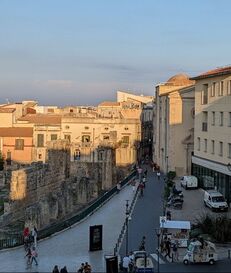 we are called to stand up for our faith respectfully we are called to stand up for our faith respectfully It is all too often that we see or hear about something that disparages Christianity or belief in God in some way. And sadly there are times when the derision is directed at us personally because of our adherence to the faith. Indeed, it is difficult when it is personal, but let us remember that detractors are as loved by God as those who are faithful. This means that while we are called to stand up for our faith, we must do so with love and respect, even in the face of disrespect, just as Jesus did. Certainly seeing people reject a merciful and compassionate God ought to move us to sadness, but as Jesus taught, we are not to be rude in return; rather, we are to respond peacefully as the situation warrants. What we do should be visibly identifiable as Christian and we should speak respectfully, but without watering down our beliefs. That said, I will not sugarcoat this: even if – (perhaps especially if) – we act in love and humility, it will cost us. Indicating the cost in discipleship Jesus said, “No servant is greater than their master,” (John 15:20). This means we are to do as He did, ‘washing the feet’ of all our neighbors (including our enemies) with actions of love, mercy, forgiveness, and welcome no matter what the response of the world may be.  purity... is an interior virture purity... is an interior virture Some of the most remarkable figures in the history of Christianity are the martyrs, the ones who chose the ultimate cost of discipleship. While they died for the faith, it is only one part of their response to His call. In other words, they did not set out to be martyrs, but chose it when they were put in a position in which they saw it as the only way to remain faithful to Jesus. While we might not be martyred through blood as they were, all disciples are called to another type of martyrdom* which comes as a result of attacks upon our practices and beliefs. If we desire to be disciples and claim to be Christian, we can be sure that we will be counted among these. An example is found in the lives of four holy women, Saints Barbara, Margaret of Antioch, Dorothea (Dorothy), and Catherine of Alexandria, all martyrs of the 3rd and 4th centuries. Not much is known about any of them, except for a common theme: they were virgins, and the purity with which they lived in some way contributed to their martyrdom. All of them died because they refused to sacrifice to the gods, which meant renouncing their belief in Jesus Christ and their adherence to Christianity, and also, each of them refused to marry a pagan man. What we know of these women reveals that purity was not just an issue of the body, but an interior virtue, a purity of intention which was expressed through their virginity. In this, they challenge us to look at our own purity of intention and whether we are willing to be made fun of, shunned, betrayed, or to fight temptations away from our faith because of our adherence to the gospel and love for Jesus. As disciples of Jesus we must expect challenges because we go to Church every Sunday, do works of mercy, do not hide or apologize for having faith,** and have moral values that we will not compromise just to ‘fit in.’ We must be willing to go against the culture which falsely professes that everything is okay and nothing is sinful. If we do so, we will sustain some scrapes and bruises on our hearts, but we will be living as true disciples.  the reward will be great in Heaven the reward will be great in Heaven The most painful assaults are those that come from our family members (or even friends) who do not hold the same beliefs and deride us for our dedication. It is true that the worst attack always comes from within: Jesus was betrayed by one of His inner circle, that is, one of His chosen apostles. Even though He knew in advance, it was still exceedingly painful for Him, and therefore He understands how we feel when we experience it. When we do, however, we are to count ourselves as blessed. Jesus said: “Blessed are you when they insult you and persecute you, and utter every kind of evil against you [falsely] because of me.” (Matthew 5:11) If we desire to live our faith with conviction, we must prepare to be challenged for doing so. But we can take comfort in knowing that those who made the ultimate sacrifice and those (perhaps like us) who have been ridiculed for having faith, are blessed and are promised that “the reward will be great in Heaven.” We should rejoice and be glad because of this. (Matthew 5:12) 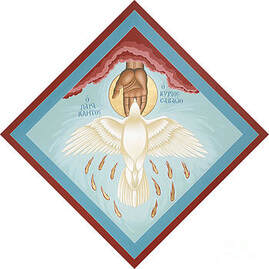 we can count on the Holy Spirit being present we can count on the Holy Spirit being present It is important that we build each other up, supporting our brothers and sisters in Christ when challenges are directed at our faith. We should never lose sight of the gospel message of Jesus, and when it gets rough, we can count on the Holy Spirit being present with the strength of grace to help us remain faithful. Jesus said: “Do not worry about how you are to speak or what you are to say. You will be given at that moment what you are to say…. it will be… the Spirit of the Father who will be speaking through you.” (Matthew 10:19ff) With this promise we can always trust in Him that indeed we are not alone, and in fact, we are truly blessed. In trusting Jesus, we await the reward of being with Him forever in Heaven.  may we give glory to God may we give glory to God May we rejoice in the witness of the martyrs, taking courage for our own efforts to spread the Good News of Jesus Christ! May we give glory to God by our steadfast love and commitment to Him! And may we continue to build up the Kingdom by witnessing to love through our word and deed! Let us meet in the Heart of Jesus! Peace! ©Michele L. Catanese * Martyrdom that results in death is referred to as red martyrdom, or bloody martyrdom. Martyrdom such as I described in which we suffer interiorly rather than physically is referred to as white martyrdom, or bloodless martyrdom. ** I am referring to an emotional response: ‘Apologizing for having faith’ is when we do not assert our beliefs when we can or should, or that we underplay it, or even compromise it by watering it down, usually in conversation and sometimes even in what we do or fail to do. In effect, our words and actions portray that we are embarrassed by the faith rather than that we are dedicated to it. Therefore, it is as if we are asking another to forgive us for believing in a way contrary to them so as not to ‘make waves’ or be seen as ‘not fitting in.’ Christianity has always been counter-cultural. (To be clear: theologically when you hear ‘apologizing for the faith’ it is referring to the use of apologetics to defend the faith, which is something we should do!) Note: If you desire more on the women mentioned who are referred to collectively as the Four Capital Virgins you can go to: St. Dorothy, https://www.catholic.org/saints/saint.php?saint_id=221 St. Catherine of Alexandria, https://www.catholic.org/saints/saint.php?saint_id=341 St. Barbara, https://www.catholic.org/saints/saint.php?saint_id=166 St. Margaret of Antioch, https://www.catholic.org/saints/saint.php?saint_id=199 Images: 1. My photo; the island of Ortigia, Siracusa, in Sicily, Italy. This shows St. Paul’s Catholic Church on the right with the dome, partially occluded by another building, across the street from Roman ruins of a temple. (It is said St. Paul preached on the spot of where the church stands today.) The contrast between pagan belief and Christianity is obvious here. 2. Panel Painting; The Four Capital Virgins (Heilige Jungfrauen), by Ulrich Mair (1480-90). It is in the “Middle Ages Collection” at the Alpinmuseum, Kempten H1 in Germany. https://commons.wikimedia.org/wiki/File:Alpinmuseum_Kempten_Hl_Jungfrauen_1485.jpg (Printed with permission: licensed under the Creative Commons Attribution-Share Alike 4.0 International license.) 3. Oil Painting; Approaching Storm, Dog Point, 1914 by Tom Thompson. 4. Image; The Holy Spirit The Lord the Giver of Life The Paraclete Sender of Peace, by Fr. William Hart McNichols. https://fineartamerica.com/featured/the-holy-spirit-the-lord-the-giver-of-life-the-paraclete-sender-of-peace-093-william-hart-mcnichols.html 5. My photo; roadside waterfall near Flam, Norway. Note: In compliance with GDPR rules, I wish to make it clear that I do not gather any information on any of my readers at any time. |
Heart Speaks to Heart
|

 RSS Feed
RSS Feed

